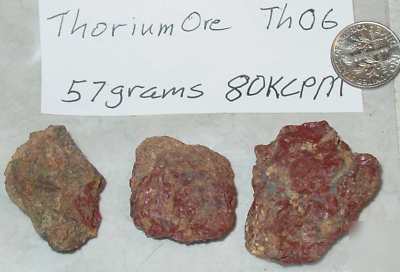Tristate Machinery Dismantlers Forum > WISCONSIN
> Motors and tools
> New
> Without Warranty
> Thorium uranium thorite uraninite mineral ore colorado
Thorium uranium thorite uraninite mineral ore colorado
Beautiful Ore Sample - Red Thorium Oxide
Naturally Occuring Thorium Uranium Oxide Mineral
Colorful Mineralization - Very Interesting
The study of geology can be a great adventure. There are many types of mineral and ore samples. Common minerals such as quartz are made up of the elements silicon and oxygen. Rutile is made up of titanium and oxygen. Bauxite is made up of aluminum and oxygen. Elements which we come into contact everyday include: hydrogen, lithium, sodium, potassium, fluorine, chlorine, bromine, and many more. Materials which are important in the energy economy of the world include nuclear materials. Elements in these nuclear materials include: Uranium, Thorium, Plutonium, Radon, Radium, lead, bismuth, polonium, americium, beryllium, boron, iron, nickel, cobalt and many more. The materials which are used in nuclear energy operations are discussed here. There are many types of radiation: heat, microwaves, light, x-rays, gamma rays, cosmic rays, beta (electrons), alpha particles (helium nuclei), neutrons, neutrinos, and others. Detection of these emissions can be measured by use of Infrared Detectors, Optical Detectors, Electromagnetic Detectors, Photographic Detectors, Metal Detectors, Microwave Detectors, Radio Detectors, Sound Detectors, Geiger Muller detectors (Geiger Counters - Alpha, Beta, Gamma), Scintillometer Detectors (NaI w/ Tl - Sodium Iodide crystals doped with Thallium Scintillator crystals - Gamma Only), Boron tri-Fluoride detectors (Neutrons), proportional counters, cloud chambers and other detector equipment and schemes. Radiation Detectors I use in my research include those manufactured by Technical Associates, Ludlum, Eberline, Bicron and others, with my principal Geiger Counter manufactured by Technical Associates. To be a trained radiological measurements student / professional / person, you need to know how to use instruments from all of these manufacturers and to compare the various capabilities of the different units available. Some of the principal minerals - ores used in the nuclear power industry include: Pitchblende, Uraninite, Uranophane, Torbernite, Tyuyamunite, Carnotite, Cuprosklodowskite, Autunite, Schoepite, Thorite, Cyrtolite, Euxenite, Samarskite, Vandenbrandeite, Soddyite, Curite, Kasolite, Clarkeite, Boltwoodite, Becquerelite, Studtite and others. University education in physics, chemistry and other disciplines requires the student to have a familiarity of the types of materials and the tools used in the analysis and processing of the aforementioned materials and many more topics.

